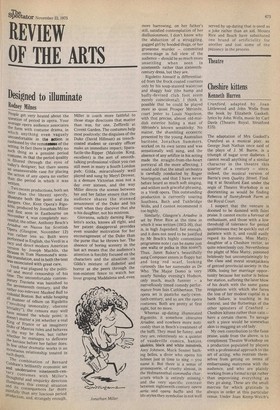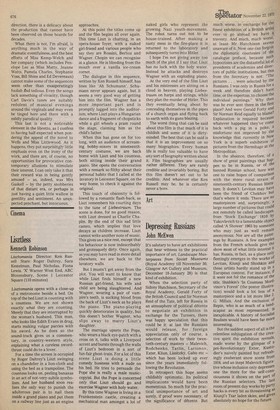Theatre
Cheshire kittens
Kenneth Hurren
Cranford, adapted by Joan Littlewood and John Wells from the book by Elizabeth Gaskell; lyrics by John Wells, music by Carl Davis (Theatre Royal, Stratford E15).
The adaptation of Mrs Gaskell's Cranford as a musical play, as George Jean Nathan once said of the plays of J. M. Barrie, is a triumph of sugar over diabetes. I cannot recall anything of a similar character in the theatre this quarter of a century — since, indeed, the musical version of Baffle's own Quality Street. Finding it at Stratford East under the aegis of Theatre Workshop is as disorienting as would be finding Rebecca of Sunnybrook Farm at the Royal Court.
I suspect that the venture is doomed to be damned with faint praise. It cannot excite a fervour of enthusiasm, and those with a low threshold of tolerance for period quaintnesses may be quickly out of patience with it, and could easily regard its heroine, Miss Matty, daughter of a Cheshire rector, as quite relentlessly coy. Nevertheless the plight of Miss Matty, pinioned helplessly but uncomplainingly by the class and moral straitjackets of genteel provincial society in the 1830s, losing her marriage opportunity because her suitor is below her station, suffering the later blow of his death with the same game resignation with which she faces the loss of her modest capital in a bank failure, is touching in its context; and the flutterings of the other spinsters of Cranford — Cheshire kittens rather than cats — have a certain charm. To savage such a piece would be somewhat akin to mugging an old lady.
My own contribution to the faint praise, aside from the above, is to compliment Theatre Workshop on a production populated by players with a professional approach to the art of acting, who restrain themselves from getting on terms of embarrassing mateyness with the audience, and who are plainly working from a formal script rather than improvising everything as they go along. These are the small mercies for which gratitude is always in order at this particular venue. Under Joan Kemp-Welch's direction, there is a delicacy about the production that cannot have been observed on those boards for decades.
What there is not, I'm afraid, is anything much in the way of dramatic eventfulness, and the best efforts of Miss Kemp-Welch and her company (which includes Penelope Lee as Miss Matty, Jeanne Watts, Pamela Charles, Stephanie Voss, Bill Shine and Ed Devereaux) cannot make some of the sequences seem other than exasperatingly foolish &id tedious. Even the songs lack something of vivacity, though Carl Davis's tunes are suitably redolent of musical evenings around the virginals and may even be tinged here and there with a mildly parodical quality.
This last is not a noticeable element in the libretto, as I confess to having half-expected when pondering the appeal of the novel to Wells and Miss Littlewood. As it happens, they put surprisingly little emphasis even on the irony of the wOrk, and there are, of course, no opportunities for provocative contemporary allusions to stimulate their interest. I can only take it that their reward was in being gently amused — as, indeed, was Mrs Gaskell — by the petty snobberies of that distant era, or perhaps in just having a quiet little wallow in gentility and sentiment. An unexpected penchant, but innocuous.

































 Previous page
Previous page